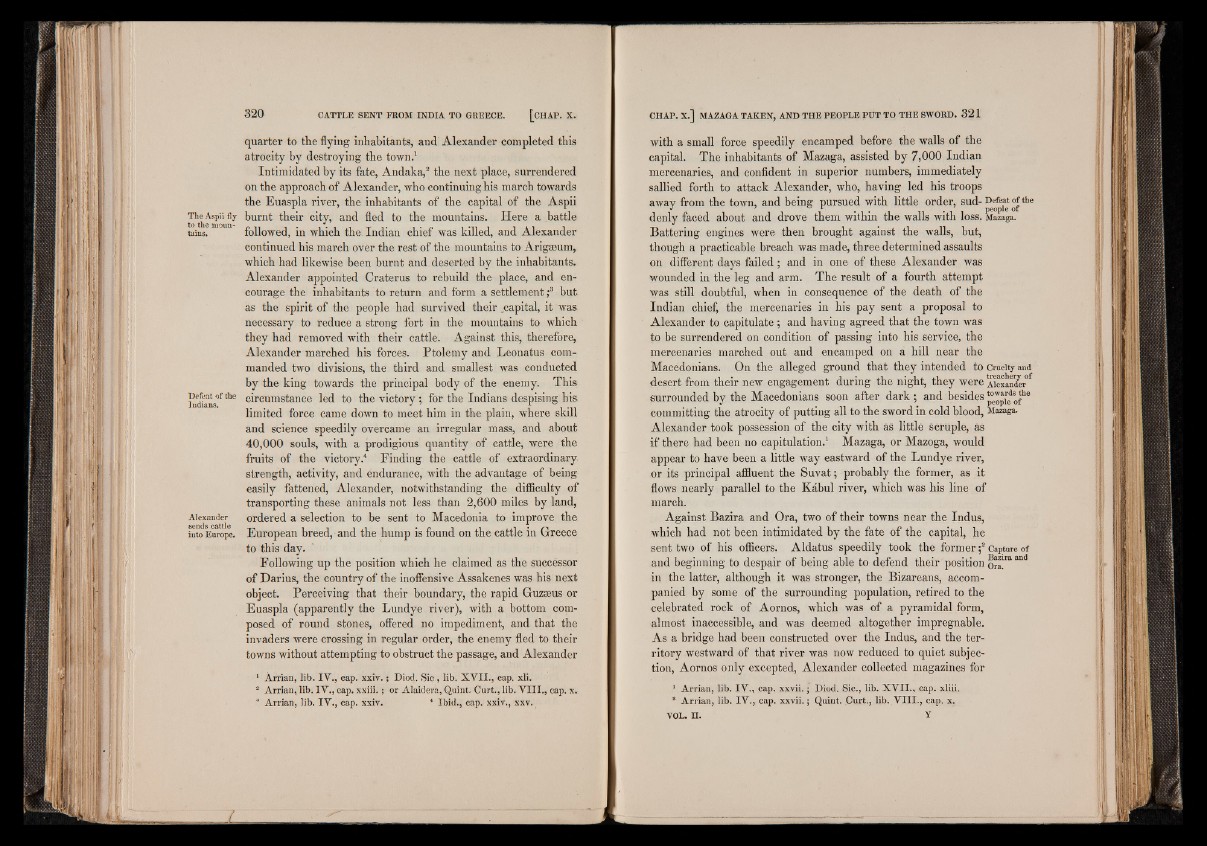
The Aspii fly
to the mountains.
Defeat of tlie
Indians.
Alexander
sends cattle
into Europe.
quarter to the flying inhabitants, and Alexander completed this
atrocity by destroying the town.1
Intimidated by its fate, Andaka,2 the next place, surrendered
on the approach of Alexander, who continuing his march towards
the Euaspla river, the inhabitants of the capital of the Aspii
burnt their city, and fled to the mountains. Here a battle
followed, in which the Indian chief was killed, and Alexander
continued his march over the rest of the mountains to Arigaeum,
which had likewise been burnt and deserted by the inhabitants.
Alexander appointed Craterus to rebuild the place, and encourage
the inhabitants to return and form a settlement ;s but
as the spirit of the people had survived their „capital, it was
necessary to reduce a strong fort in the mountains to which
they had removed with their cattle. Against this, therefore,
Alexander marched his forces. Ptolemy and Leonatus commanded
two divisions, the third and smallest was conducted
by the king towards the principal body of the enemy. This
circumstance led to the victory; for the Indians despising his
limited force came down to meet him in the plain, where skill
and science speedily overcame an irregular mass, and about
40,000 souls, with a prodigious quantity of cattle, were the
fruits of the victory.4 Finding the cattle of extraordinary
strength, activity, and endurance, with the advantage of being
easily fattened, Alexander, notwithstanding the difficulty of
transporting these animals not less than 2,600 miles by land,
ordered a selection to be sent to Macedonia to improve the
European breed, and the hump is found on the cattle in Greece
to this day.
Following up the position which he claimed as the successor
of Darius, the country of the inoffensive Assakenes was his next
object. Perceiving that their boundary, the rapid Guzaeus or
Euaspla (apparently the Lundye river), with a bottom composed
of round stones, offered no impediment, and that the
invaders were crossing in regular order, the enemy fled to their
towns without attempting to obstruct the passage, and Alexander
1 Arrian, lib. IV ., cap. x x iv .; Diod. S ic , lib. X V I I ., cap. xli.
2 Arrian,lib. IV ., cap. x x iii.; or Alaidera, Quint. Curt., lib. V I I I ., cap. x.
<* Arrian, lib. IV ., cap. xxiv. 4 Ibid., cap. xxiv., xxv.
with a small force speedily encamped before the walls of the
capital. The inhabitants of Mazaga, assisted by 7,000 Indian
mercenaries, and confident in superior numbers, immediately
sallied forth to attack Alexander, who, having led his troops
away from the town, and being pursued with little order, sud- tbe
denly faced about and drove them within the walls with loss. Mazaga.
Battering engines were then brought against the walls, but,
though a practicable breach was made, three determined assaults
on different days failed; and in one of these Alexander was
wounded in the leg and arm. The result of a fourth attempt
was still doubtful, when in consequence of the death of the
Indian chief, the mercenaries in his pay sent a proposal to
Alexander to capitulate ; and having agreed that the town was
to be surrendered on condition of passing into his service, the
mercenaries marched out and encamped on a hill near the
Macedonians. On the alleged ground that they intended to Cruelty and
desert from their new engagement during the night, they were ‘” S °f
surrounded by the Macedonians soon after dark ; and besides
committing the atrocity of putting all to the sword in cold blood, Mazaga.
Alexander took possession of the city with as little scruple, as
if there had been no capitulation.1 Mazaga, or Mazoga, would
appear to have been a little way eastward of the Lundye river,
or its principal affluent the Suvat; probably the former, as it
flows nearly parallel to the Kabul river, which was his line of
march.
Against Bazira and Ora, two of their towns near the Indus,
which had not been intimidated by the fate of the capital, he
sent two of his officers. Aldatus speedily took the former f capture of
and beginning to despair of being able to defend their position ora!™
in the latter, although it was stronger, the Bizareans, accompanied
by some of the surrounding population, retired to the
celebrated rock of Aornos, which was of a pyramidal form,
almost inaccessible, and was deemed altogether impregnable.
As a bridge had been constructed over the Indus, and the territory
westward of that river was now reduced to quiet subjection,
Aornos only excepted, Alexander collected magazines for
1 Arrian, lib. IV ., cap. xxvii. ; Diod. Sic., lib. X V I I ., cap. xliii.
a Arrian, lib. IV ., cap. x x v ii.; Quint. Curt., lib. V H L , cap. x.
VOL. H. Y